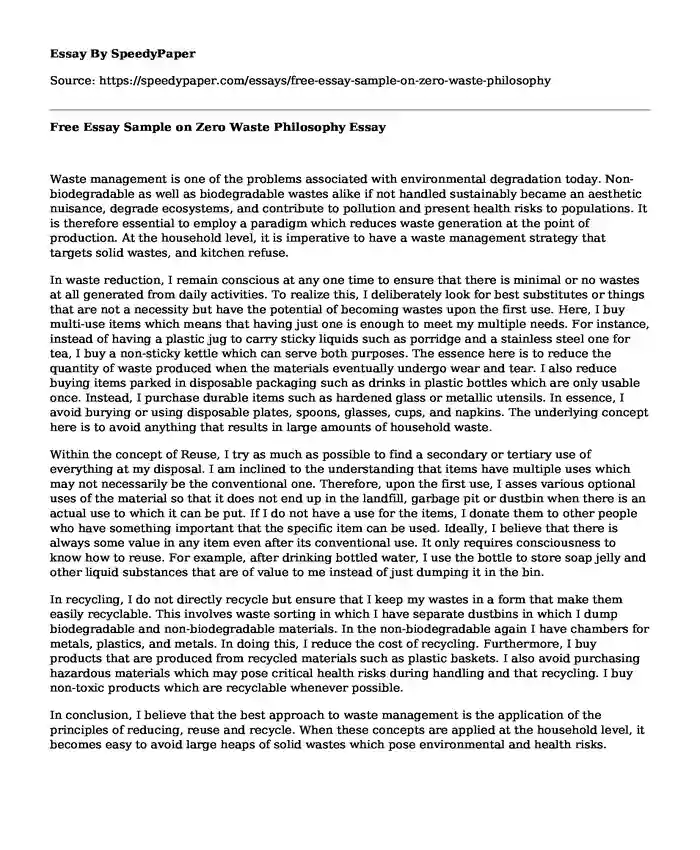Waste management is one of the problems associated with environmental degradation today. Non-biodegradable as well as biodegradable wastes alike if not handled sustainably became an aesthetic nuisance, degrade ecosystems, and contribute to pollution and present health risks to populations. It is therefore essential to employ a paradigm which reduces waste generation at the point of production. At the household level, it is imperative to have a waste management strategy that targets solid wastes, and kitchen refuse.
In waste reduction, I remain conscious at any one time to ensure that there is minimal or no wastes at all generated from daily activities. To realize this, I deliberately look for best substitutes or things that are not a necessity but have the potential of becoming wastes upon the first use. Here, I buy multi-use items which means that having just one is enough to meet my multiple needs. For instance, instead of having a plastic jug to carry sticky liquids such as porridge and a stainless steel one for tea, I buy a non-sticky kettle which can serve both purposes. The essence here is to reduce the quantity of waste produced when the materials eventually undergo wear and tear. I also reduce buying items parked in disposable packaging such as drinks in plastic bottles which are only usable once. Instead, I purchase durable items such as hardened glass or metallic utensils. In essence, I avoid burying or using disposable plates, spoons, glasses, cups, and napkins. The underlying concept here is to avoid anything that results in large amounts of household waste.
Within the concept of Reuse, I try as much as possible to find a secondary or tertiary use of everything at my disposal. I am inclined to the understanding that items have multiple uses which may not necessarily be the conventional one. Therefore, upon the first use, I asses various optional uses of the material so that it does not end up in the landfill, garbage pit or dustbin when there is an actual use to which it can be put. If I do not have a use for the items, I donate them to other people who have something important that the specific item can be used. Ideally, I believe that there is always some value in any item even after its conventional use. It only requires consciousness to know how to reuse. For example, after drinking bottled water, I use the bottle to store soap jelly and other liquid substances that are of value to me instead of just dumping it in the bin.
In recycling, I do not directly recycle but ensure that I keep my wastes in a form that make them easily recyclable. This involves waste sorting in which I have separate dustbins in which I dump biodegradable and non-biodegradable materials. In the non-biodegradable again I have chambers for metals, plastics, and metals. In doing this, I reduce the cost of recycling. Furthermore, I buy products that are produced from recycled materials such as plastic baskets. I also avoid purchasing hazardous materials which may pose critical health risks during handling and that recycling. I buy non-toxic products which are recyclable whenever possible.
In conclusion, I believe that the best approach to waste management is the application of the principles of reducing, reuse and recycle. When these concepts are applied at the household level, it becomes easy to avoid large heaps of solid wastes which pose environmental and health risks.
Cite this page
Free Essay Sample on Zero Waste Philosophy. (2022, Dec 15). Retrieved from https://speedypaper.net/essays/free-essay-sample-on-zero-waste-philosophy
Request Removal
If you are the original author of this essay and no longer wish to have it published on the SpeedyPaper website, please click below to request its removal:
- Free Essay on Deviance and Crime
- MDS Micro Vs Supermicro/ Brown/ Dickerman - Free Essay in Antitrust Law
- Literary Essay Sample: Role of Context in Interpretation of Meaning
- Therapeutic Recreation Activities, Psychotherapy Essay Sample
- Free Paper Sample on Techniques for Managing Cash Flow and Pricing
- Free Essay Example on Meena's Factors
- Paper Example on Concept of Decision Making
Popular categories





